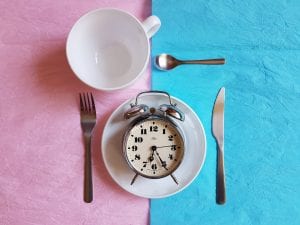Time to Feel Better: 5 Easy Circadian Rhythm Reset Secrets
 Do you continuously wake up at 5AM and feel thoroughly rested—officially ready to start your day?
Do you continuously wake up at 5AM and feel thoroughly rested—officially ready to start your day?
If you do, it’s likely that you’ve established strong sleep-wake routines that keep your circadian rhythm(s) in check. For those that answered a firm no, it might be time to reconsider switching up or completely replacing some of your daily rituals.
Why?
How much sleep we get and when we get it correlates directly with our metabolic health and overall liveliness in the long run. If you want to feel and perform at your best (But really, who would say no to that?), read on for some circadian rhythm reset tidbits.
CIRCADIAN RHYTHM: A LITTLE INTRO BEFORE THE MAIN COURSE
Let’s cut right to the chase.
In the words of Satchidananda (Satchin) Panda, PhD, professor in the Regulatory Biology Department at the Salk Institute for Biological Studies, and a key figure in molecular research on circadian rhythm, “Circadian rhythms are daily ~24h (24 hour) rhythms in metabolism, physiology and behavior that are sustained under constant light or dark condition.”
Basically put (given that this is such an intricate topic), circadian rhythm consists of multiple interconnected systems in our bodies that keep track of time, thereby correlating directly with patterns in sleeping and waking up.
In turn, these sleep-wake patterns impact our brains and other organs2. For example, if we stick with a set schedule of sleeping (and eating) each day, our bodies get primed to maintain a healthy weight and strong metabolism, promoting overall health and well-being.
The opposite is also true.
If we keep switching up our daily routine of sleeping (and eating), our circadian rhythm systems get confused, our bodies and internal organs become more difficult to regulate, and we easily become tired during random periods of the day. Our circadian rhythms are not rigid timing systems. Everything is interconnected—brain, organs, tissues, cells, genes—through multiple feedback loops. In order to help maintain our health in the long run, it’s crucial that we follow a daily pattern—to the best of our ability—of sleeping and eating.
NOW TO THE GOOD STUFF!
Now that we have a better understanding of what circadian rhythm is, how it works, and why it’s so important to our overall health, let’s explore a few methods to practice so that we can feel rejuvenated and energized each morning (and throughout the day).
And side note, I speak from experience when I say that these tips have personally been life-changing when it comes to my own morning routine. These are the introductory baby steps:
- GET TO BED EARLY

I cannot stress enough the importance of a good night’s sleep in order to maintain long- term health. When starting out, try going to bed an hour earlier than you normally would, and make that last hour a period of relaxation; really, you deserve it!
During that last hour (or earlier, if you choose), dim or turn out the bright lights. Studies suggest that controlling light exposure helps reset our circadian rhythm by allowing melatonin (the hormone responsible for sleep-wake regulation) to release in line as the sun goes down and evening approaches.
- WAKE UP EARLY

With getting to sleep an hour earlier in place, now try waking up early. For example, if you go to bed at 9PM the night before, set your alarm for 4 or 5AM in the morning. I say this keeping adults in mind, because it’s important that we get roughly 7-9 hours of sleep.
Try waking up as soon as your alarm goes off the first time. Avoid the temptation of hitting the snooze button! That’s the hardest part. But if you can successfully do this, give yourself a pat on the back; you’re on the right track for resetting your circadian rhythm. Immediately go to turn on a dim light, and maybe do a couple of morning stretches to help wake up. I promise it gets easier over time the more this is done.
- DRINK WATER FIRST THING IN THE MORNING

The alarm goes off, but put a pause on starting up the coffee machine. Instead, grab an 8 oz. glass and drink roughly two glasses-worth of room temperature water. Research shows that drinking water on an empty stomach can increase your metabolic rate and improve your digestive tract. After roughly 7-9 hours of sleep, your body becomes dehydrated, so water should be the first thing you grab. Sorry almond milk latte.
Not convincing enough? A morning glass of water helps maintain the immune system, gives you energy, and fuels your brain into alertness6. It’s not called the Essence of Life for nothing!
- EXERCISE MODERATELY

My personal favorite, mainly because I prefer exercising in the morning. Rather than waiting until my energy is spent mid-day, I get more benefit from doing a morning yoga practice (usually 1 hour). It’s different for everyone. Some prefer a light walk or jog just as dawn approaches. In fact, try timing your waking up and exercise routine with the rising sun. Exposure to sunlight in the early morning will help fine-tune the body’s circadian rhythm–keeping you adequately awake throughout the day until the sun sets3.
Overall, moving your body just feels good! A morning exercise routine does wonders for mood and anxiety levels. Afterwards, the rest of your day will be a lot easier to tackle. I usually top off my morning yoga with 30 minutes of seated meditation. It’s an extra concentration booster towards whatever tasks I have scheduled to complete. Bottom line, movement is medicine.
- EAT BREAKFAST AN HOUR AFTER WAKING

The absolute best part about sleep? It’s literally a time machine to breakfast.
Okay, I lied, this is probably my most favorite part out of an established sleep-wake routine. It’s likely that I can speak for most people in this realm.
When it comes to eating, our circadian rhythm “regulates metabolism in response to different nutrients and based on the timing of food intake. Key endocrine functions…appear to be optimal in the morning, suggesting that concentrating food intake within the earlier daylight hours is superior for circadian alignment.” If food is presented at the wrong time, it disturbs the entire circuit.
Therefore, for optimal health results, refrain from eating food at least 1 hour after waking up—remember, water comes first! Considering that food intake is better for our bodies during the earlier half of the day, try eating both breakfast and lunch during that period.
Let’s stick with our previous example of going to bed at 9PM in Step 2.
If you wake up the next day…say… at 5AM, don’t eat breakfast until 6-7AM. Between that time gap, you have the perfect opportunity to exercise (Step 4). This is an easy trick to keep your mind off food. Plus, after exercising, you’ll feel like you actually earned your breakfast! From there, make lunch your heaviest meal, and consume it roughly from 11AM-12PM. Following this schedule, it’s best to cut off eating around 5-6PM, so eat dinner during this time.
This gives you a 3-4 hour leeway to digest your food before winding down to bed–overall, a 12-hour eating cycle. By condensing the eating window to 12 hours (or shorter), we allow our bodies to fast and repair tissue overnight7.
A FINAL NOTE:
 Due to the hectic demands of everyday life, work schedules (particularly shift work), and different time zones, I’m aware that some of these suggestions may not be easily accessible.
Due to the hectic demands of everyday life, work schedules (particularly shift work), and different time zones, I’m aware that some of these suggestions may not be easily accessible.
For long-term results, approach as many of these methods as you can in gradual steps. Quite often, small changes overtime are easier on you, both physically and mentally.
And if you fall off the wagon on any of these 5 Steps, don’t beat yourself up for it. Instead, just mindfully recognize where you left off, and pick up from there. It’s a process –a marathon, not a sprint.
The key is to practice.








